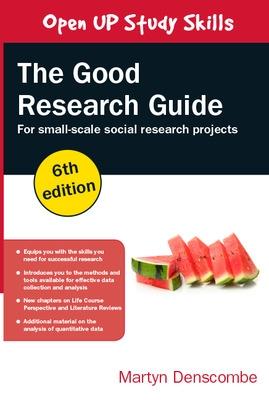This bestselling introductory book offers practical and straightforward guidance on the basics of social research, ideal for anyone who needs to conduct small-scale research projects as part of their undergraduate, postgraduate or professional studies.
The book provides:
• A clear, straightforward introduction to data collection methods and data analysis
• Jargon-free coverage of the key issues
• Checklists to guide good practice
The sixth edition has been extensively updated and includes features such as:
• A new chapter on the Life Course Perspective
• A new chapter on Literature Reviews
• New material on the Delphi Technique
• An updated and expanded chapter on the analysis of Quantitative Data
• New examples and illustrations throughout
The Good Research Guide, 6th edition is a valuable resource for anyone conducting social research including those in applied areas such as business studies, health studies, nursing, education, social work, policy studies, marketing, media studies and criminology."Denscombe's The Good Research Guide, now in its 6th edition, continues to be one of the leading books in the field. It covers the topics a student or practitioner doing a research project needs to know from project design, theoretical underpinnings of research, data collection and analysis to writing up your research. Its accessible and practical approach means that it is an excellent resource for those new to undertaking independent research."
Liam Foster, Senior Lecturer in Social Policy and Social Work, Sheffield University, UK
"Martyn Denscombe's text continues to remain core reading for those undertaking small pieces of research and those who need to gain a firm grounding in the principles of research theory and practice. From deciding on a research approach to the process of writing up, this finely balanced edition offers a comprehensive and detailed guide to the research cycle. Pragmatic, and with the needs of the researcher always in mind, it makes social science research accessible, undaunting, and, what's more, a completely possible, stimulating, and enjoyable endeavour."
Yunis Alam, Faculty of Social Sciences, University of Bradford, UK
"The Good Research Guide provides a comprehensive view of the complex strategies and approaches of conducting social research, explained in simple terms. Relevant examples and check lists provided in each section not only helps to gain better understanding but also reflect on one’s own research.
This book has tremendously helped me to gain knowledge and understanding of complex research strategies. It will provide clear guidance and direction for students and researchers in their research journey to achieve success."
Deborah Ebenezer, Research Student
"I think the book has a very good précis of areas relevant to the title. It outlines very well in a logical order the elements pertinent to 'social research'. Each chapter is relatively comprehensive and deals with subject material that is important, in a language that is accessible throughout. It does what it says on the tin and provides practical information and guidance as a 'how to' text' for those needing help with this type of research project. In particular I think the checklists are an excellent chapter ending to help plan and bring into sharp focus what is needed for any particular approach. The within chapter examples are excellent and help to further inform the reader what the author is trying to convey. Chapter links help further embed concepts and show how the various research elements may be associated.
Overall an excellent introductory text that embodies a no-nonsense approach to a subject that can be at times complex. By breaking down topic areas and giving simple examples the subject is eminently accessible to the reader. Well done!"
Stephen Pearson, Senior Lecturer in Human and Applied Physiology, School of Health Sciences, University of Salford, UK"This new edition provides comprehensive guidance to those undertaking small-scale social research projects including dissertations in business and management and the social sciences and I would recommend its use for all those new to research and also to refresh the thinking of those with prior research experience. Part 1 addresses a range of strategies for social research including surveys, sampling, case studies, experiments, ethnography, the life course perspective, grounded theory, action research, phenomenology, systematic review and mixed methods. There are few texts which address research strategies in such a comprehensive manner. The text develops in Part 2 by providing clear guidance on the selection and use of appropriate methods of data collection such as questionnaires, interviews, observation and documentary analysis, taking into account the aims and objective of the research project. Part 4 considers both quantitative and qualitative data analysis with Part 4 providing essential information on research ethics, the reporting of research and on the conduct and presentation of the literature review essential to all research projects.
I have no hesitation in commending this text for use by undergraduate and post-graduate students as well as those undertaking research projects independent of an academic programme."
Dr. Bobby Mackie, Senior Lecturer, School of Business and Enterprise, University of the West of Scotland, UK
- ISBN13 9780335226863
- Publish Date 16 June 2017 (first published 1 January 2014)
- Publish Status Out of Print
- Out of Print 8 October 2021
- Publish Country GB
- Imprint Open University Press
- Edition 6th edition
- Format Paperback
- Pages 418
- Language English
